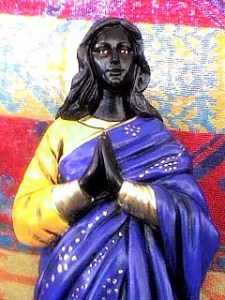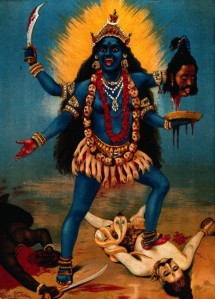St. Sarah, Kali Sara, Sara Kali, Sara-la-Kali, Sati-Sara, The Black Madonna, The Black Mother… many names for one Goddess-Saint sacred to Roma all over the world. Today is her festival– she is the Goddess of Fate, good fortune, fertility, and protection– and Roma honor her in pilgrimage, by worshiping her statue, through dance and community… so many ways, so many incarnations of the goddess who accompanied the Roma all the way from India.
Take a look at these articles below for more information about the Goddess-Saint, Romanipen/Romani religion/spirituality, and her celebration. Be sure to click the links for the whole articles.
“Until recently it was widely believed that this worship of Kali Sara, the Romani Black Madonna or Goddess was unique to Les Saintes Maries de La Mer. My own recent research among Romani refugees from the Czech Republic, Slovakia, Poland and in countries of the Balkans has uncovered the little-known fact that other Black Virgins are worshipped by Roma in central/eastern Europe and that Roma from these countries perform similar rituals. These rituals include laying flowers at the feet of the statue, adorning the statue with clothing of the sick hoping for cures, placing requests to the statue, and lighting candles to the female divinity. To the Roma, Kali Sara is the Protectress who will cure sickness, bring good luck and fertility and grant success in business ventures.
The Romani ceremony at Les Saintes Maries, as elsewhere, consists of carrying the statue on a platform strewn with flowers (4) into the closest body of water such as a sea, lake, flowing river or even a large pond of clear water. The platform is then lowered to touch the water while the crowd throws flowers into the water. Indian scholars such as Dr. Weer Rishi (5) and others who have witnessed this Romani ceremony, as well as Western observers who are familiar with Hindu religious customs have identified this ceremony with the Durga Poojaof India. In Romani, Kali Sara means Black Sara and in India, the Goddess Kali is known as Kali/Durga/Sara. Like the Hindus, the Roma practice shaktism, the worship of Goddesses. In other words, the Roma who attend the pilgrimage to Les Saintes Maries in France and in other related ceremonies elsewhere honouring black female divinities, are in fact continuing to worship Kali/Durga/Sara their original Goddess in India.According to the Durgasaptashati (seven hundred verses in the worship of Goddess Durga and her various forms), chapter 5, verse 12, which mentions Sara, contains the following: “Salute to Durga, Durgapara, (Deliver of all difficulties), Sara, (Embodiment of everything par-excellent), Cause of everything, Krishna and Dhurma (Evaporated form in smoke).” Other references in this ancient Hindu scripture also confirm that Sara is one and the same with the Indian goddess Durga who is also another aspect of Kali, the consort of Shiva.” —“THE ROMANI GODDESS KALI SARA” by RONALD LEE
“Some Romani groups in Europe today appear to maintain elements of Shaktism or goddess-worship; the Rajputs worshipped the warrior-goddess Parvati, another name for the female deity Sati-Sara, who is Saint Sarah, the Romani Goddess of Fate. That she forms part of the yearly pilgrimage to La Camargue at Stes. Maries de la Mer in the south of France is of particular significance; here she is carried into the sea just as she is carried into the waters of the Ganges each December in India. Both Sati-Sara and St. Sarah wear a crown, both are also called Kali, and both have shining faces painted black. Sati-Sara is a consort of the god Ðiva, and is known by many other names, Bhadrakali, Uma, Durga and Syamaamong them.” —
“ROMANI (‘GYPSY’) RELIGION” by Ian Hancock
Sara, toi la sainte patronne des voyageurs et gitans du monde entier,
tu as vécu en ce lieu des Saintes-Maries-de-la-Mer.
Tu es venue d’un lointain pays au-delà des mers.
J’aime venir te retrouver ici, te dire tout ce que j’ai dans le Cœur,
te confier mes peines et mes joies.
Je te prie pour tous les membres de ma famille et tous mes amis.
Sara, veille sur moi!(Sara, patron saint of travelers and gypsies the world over, you who lived in this region of Saintes-Maries-de-la-Mer. You came from a far-away country from across the seas. I love to come and find you here, to tell you all that I have in my heart and in you confide my sorrows and joys. I pray to you for everyone in my family and all my friends. Sara, come to me!) —Saint Sara-la-Kali: A Sister to Kali Maa




Kali Sara is Sura Anahita of ancient Persia. Please see any website of Aradvi Sura Anahita. More details are easily available.
Regards,
RS
There is an overwhelming amount of evidence supporting that Kali Sara has Indian origins, and information on that is also readily available. But thank you for mentioning an alternative theory.
Hi Jessica. This is a very fascinating article and it’s amazing how certain practices (such as worship of the mother goddess — Kali/Durga) have survived through so many centuries. I am a Bengali Hindu and we celebrate Kali Puja as well as Durga Puja with similar traditions (after the ceremonies the idols are immersed in the river). I am currently doing some research on Roma sub-groups and particularly, the Kale/Kalo sub-group and would be grateful if you could point me to relevant resources on the Internet. Many thanks.